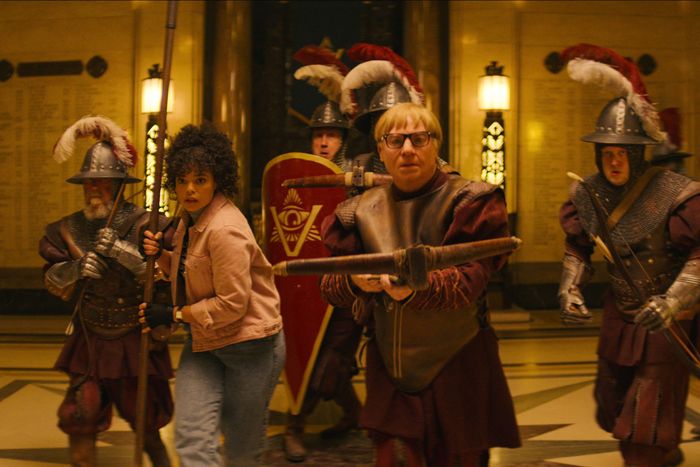
There is no denying the endurance of the humble poop joke. Next to death and sex, it stands constant. Jokes about race and gender may rise and fall. Jokes about marriage and politics and pop culture wash in and out like waves. But the human body remains, so the poop joke does too. (Or maybe it does … two?)
This certainty is not the sole basis for Mike Myers’s new Netflix series, The Pentaverate, but it’s a central pillar. Twenty years ago, Myers’s career was at its peak, thanks to his SNL characters, his Austin Powers movies, and his voice performance as Shrek. Myers and his personae were appealing comedic enigmas, with his incredibly rude humor and mild Canadian self-presentation, a kaleidoscopic range of characters and physical transformations, raucous offensiveness and an obsession with the gap between surface appearances and what was underneath. He was everywhere. Was this his shtick? Was this his art? Could both things be true? Then, around 2010, he mostly disappeared. While he could still be seen doing the occasional project — like creating a character to host the revival of The Gong Show — he seemed to be taking a deliberate break. So the question of what new Mike Myers work might look like is a fascinating one, the kind of fascinating that tips over into concerning. Resurrecting a megapopular comic sensibility years later is a scenario primed for disaster. And yet, for the most part, The Pentaverate manages to dodge calamity.
The Pentaverate’s premise is not wholly new. Its roots are in a couple throwaway lines from Myers’s 1993 movie So I Married an Axe Murderer, and the concept has stayed roughly the same: Five of the richest people in the world are actually members of a supersecret society. No one who has seen a Myers movie will be surprised to hear that he plays most of them, including a Rupert Murdoch–style media mogul, a Russian oligarch, an old British dude, and legendary music manager Shep Gordon. (Gordon is a real person — Myers even co-directed a documentary about him.) Myers also plays the protagonist, Ken Scarborough, a sheltered Canadian reporter who needs to land a really big story in order to keep his job at a local TV station. You may also be unsurprised to hear that the station is called CACA News.
Ken has a young colleague named Reilly (a very game Lydia West) who wants to help him keep his job. When the two of them overhear an Infowars-esque conspiracy theorist (also played by Myers) ranting about the existence of a group called the Pentaverate, they set off to uncover the truth. Meanwhile, there’s uproar within the Pentaverate after one of the five members dies unexpectedly, forcing them to initiate a new member and bring in an expert investigator (British comedy god Jennifer Saunders) to look into the mysterious death. Ken manages to infiltrate the Pentaverate’s headquarters, which sets off an increasingly absurd and rapidly developing chain of unfolding secrets and silly miscommunications.
Without that forward momentum, things could get dire. The show wants
to wallow in humorous pigsties, in poop jokes and sex jokes as far as the eye can see. There are long exchanges between characters that circle several times around a suggestively named hotel, attempts at “Who’s on first?” patter, a lingering shot of a sasquatch defecating in a hallway. (You get the sense that the show’s creators really want to get the most out of those five seconds.) Beyond that, the guiding principles of The Pentaverate’s humor are a little timid. Myers uses the fact that Ken and Reilly are from Canada — depicted here as a quaint yet comparatively sane cultural backwater — to take cracks at both that country and the U.S. There are digs at conspiracy theorists and Pizzagate. There are parodies of the wealthy and powerful, with jokes about swag bags and celebrities and exclusive luxury events. While this much bathroom humor does require a certain amount of confidence, The Pentaverate feels cautious.
More than anything else, The Pentaverate is a more anxious TV-show version of Austin Powers — not the franchise but the character. Its core lies close to Austin’s sweeter, softer sides, those moments when the Myers voice truly seems to feel bad about making someone uncomfortable. Even at his most thoughtless and misogynistic, Austin’s central impulse is never ill will. In a similar way, the Pentaverate may be a secret cabal, but its members are also nice. As you watch Myers play a whole host of goofuses and gallants, each of them padded, rounded, stretched, or shrunk into a not-quite-unrecognizable new shape, his comedy DNA comes into focus — a persona and ideology trapped in amber, then reanimated decades in the future. His sense of humor and methodology are so little changed that the series itself seems pleased but perplexed to be here.
The other through-line is self-referential winking. There are some Netflix jokes in this Netflix show, about as spicy as a mayonnaise sandwich. Myers
nods to both his own previous roles and those of his guest stars (including Keegan-Michael Key, Ken Jeong, and Debi Mazar), which only underlines The Pentaverate’s happily surprised self-consciousness. At times, the performances carry a hint of confusion — well, everyone’s except for that of Saunders, who is stunningly unflappable. When Key hears a phrase pronounced in a way that sounds like the words “Key or Peele,” he turns to the camera and grins, as though he has received a party favor: “C’mon now.” Yes! The Pentaverate seems to say. This is a reference we all know — how fun!
And it is fun, a little, even though it feels like a comic sensibility that has walked onto a streaming platform and proclaimed, “How do you do, fellow kids?” This is a Myers show, and it offers all the comfort and eye-rolling fatigue you’d expect from that, regardless of what year it is. That’s the resilience of juvenile humor: It never ages.


